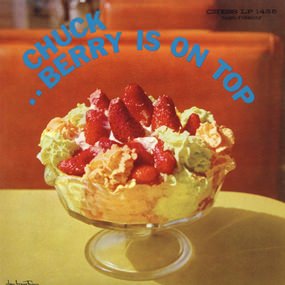
Bo Diddley: Go Bo Diddley (Checker)
The production is the most obvious difference between The Beatles and The Rolling Stones’ earliest recordings. The Beatles and George Martin was concerned with clarity, it was easy to distinguish the individual instruments; the mixing was balanced focusing on the complete register from bass to treble, it sounded punchy and sometimes downright delicious.
In comparison, the Stones’ recordings were chaotic and rowdy, Jagger’s vocals were drowned in the uproar, you could hardly catch more than a few words, it was a messy, trebly blend powered by Bill Wyman’s frantic bass-runs snapping at your eardrums. But the Stones’ overwhelming enthusiasm more than made up for their lack of sophistication.
Although the bands had the same reference points, they chose opposite paths. The Beatles were not purists, they dared to break free from the originals and update them in their own image, in creative collaboration with George Martin who belonged to a world of classical music and novelty records, not a single rock’n’roll bone in his body. Beatles took a sad song and made it better.
The early Stones were on a different journey. They adored the originals and tried their best to recreate them, but studio noobs as they were, not the least their manager and so-called producer Andrew Loog Oldham, they managed to stumble into uncharted territory nonetheless. They actually do sound authentic in their strange and charmingly English way. It took a long time before they realized that they had it in them to write original songs that matched and even exceeded their idols.
Which brings us to July 1959 when Bo Diddley’s second LP was released. This is where the Stones were in 1963-64, this is the sound they tried to recreate. That basement sound, raw, often based on Diddley’s stabbing, clattering rhythm-guitar playing, pushing the tunes forward with fierce support from drums and bass – the sound is spacious and humid, the use of echo vast and suggestive. The Stones took great pains to copy it, but ended up as quite impressive pretenders trying a bit too hard to ignite the Chicago sound in sleepy London town.
Bo Diddley is the real thing; his craving electric blues is raw and wicked, but also exceptionally elegant. The cover photo says it all: This guy knows who he is, you better not mess with him.
The album contains a number of single-cuts that were released before and after the album. Among the most famous are “Crackin ‘Up,” “Say Man” and “Little Girl” (covered by The Yardbirds a few years later). Other songs worth noting on this brilliant album are “The Great Grandfather” (dark and mysterious, excessively slow) and the instrumental “The Clock Strikes Twelve” (that’s Diddley himself playing the fiddle that makes this recording so magical).
Worth mentioning: The legendary Willie Dixon is on bass, as he was on most of Diddley’s (and Chuck Berry’s) recordings in the late 50’s being a staff player at Chess.
The 1950’s were not exactly the decade of the LP. But some releases definitely deserve a place among the classic albums from the 60’s and the 70’s. This is one of them.
Recorded: March 2, 1955 – September 1958 in Chicago, Illinois
Released in July 1959
(All songs written by Ellas McDaniel)
The original recordings in mono format where recorded with an Ampex-350 tape recorder. The songs “You Don’t Love Me (You Don’t Care” and “Little Girl” were from Bo’s first session for Chess Records on March 2, 1955.
Side One
“Crackin’ Up” – 2:41
“I’m Sorry” – 2:30
“Bo’s Guitar” – 2:38
“Willie and Lillie” – 2:34
“You Don’t Love Me (You Don’t Care)” – 2:36
“Say Man” – 2:30
Side Two
“The Great Grandfather” – 2:40
“Oh Yea” – 2:30
“Don’t Let It Go” – 2:36
“Little Girl” – 2:35
“Dearest Darling” – 2:32
“The Clock Strikes Twelve” – 2:35
Personnel:
Bo Diddley – vocals, guitar; violin on “The Clock Strikes Twelve”
Peggy Jones – guitar, backing vocals
Jerome Green – co-lead vocals on “Say Man”, maracas
Willie Dixon – bass
Clifton James – drums
Frank Kirkland – drums
Billy Boy Arnold – harmonica on “You Don’t Love Me (You Don’t Care)” and “Little Girl”
Lafayette Leake – piano
Otis Spann – piano

Chuck Berry: Chuck Berry Is On Top (Chess)
Chuck Berry’s third LP is an arrogant display of genius, almost carelessly tossed out in record stores in July 1959. You could build a career on this material. Half Great Britain did. And The Rolling Stones more than any.
The distinctive intros, the guitar riffs, the playful solo-runs, the rhythm that makes you do the duck walk whether you want to or not, and the icing of the cake: the lyrics. Chuck Berry was the first storyteller of rock, each song was a short story, a joyous slice of teenage-America told with precision and style, no one had or has ever been close before or after. Berry’s phrasing and timing are excellent and gave the young Robert Zimmermann something to think about.
Most cuts here are considered super classics. There are thousands of cover versions out there. Few if any surpass the originals. The lesser-known cuts are not exactly second rate, either. “Hey Pedro” delivers Berry, the humorist, while LP’ns only brand new recording, the instrumental “Blues For Hawaiians”, is a precious piece of world music, the Chicago blues meets the whining steel guitar of the Pacific, and gets away with it.
As on the Bo Diddley-album, Willie Dixon plays bass.
Recorded: May 21, 1955–1959 in Chicago, Illionis
Released in July 1959
(All songs written by Chuck Berry)
Side One
“Almost Grown” – 2:21
“Carol” – 2:48
“Maybellene” – 2:23
“Sweet Little Rock & Roller” – 2:22
“Anthony Boy” – 1:54
“Johnny B. Goode” – 2:41
Side Two
“Little Queenie” – 2:43
“Jo Jo Gunne” – 2:47
“Roll Over Beethoven” – 2:24
“Around and Around” – 2:42
“Hey Pedro” – 1:57
“Blues for Hawaiians” – 3:23
Personnel:
Chuck Berry – guitar, lead vocals
Fred Below – drums
Bo Diddley – guitar
Willie Dixon – bass
Jerome Green – maracas
Ebbie Hardy – drums
Johnnie Johnson – piano
Lafayette Leake – piano
The Moonglows – backing vocals
George Smith – bass
Jaspar Thomas – drums
First published in Pattaya Mail on September 5, 2013
 |
 |
 |





